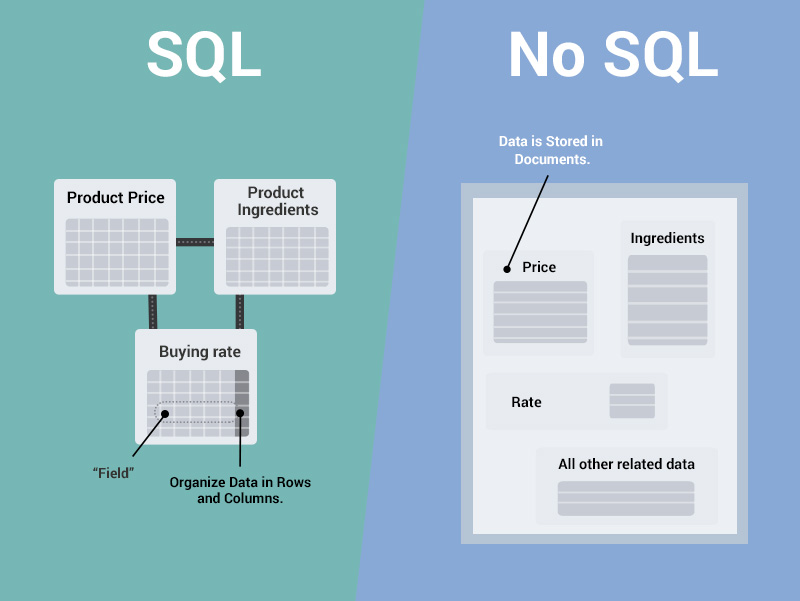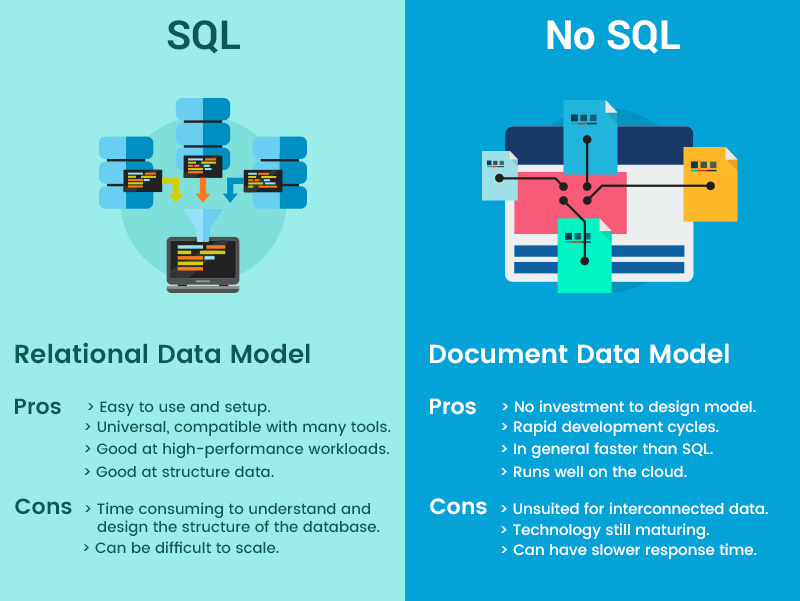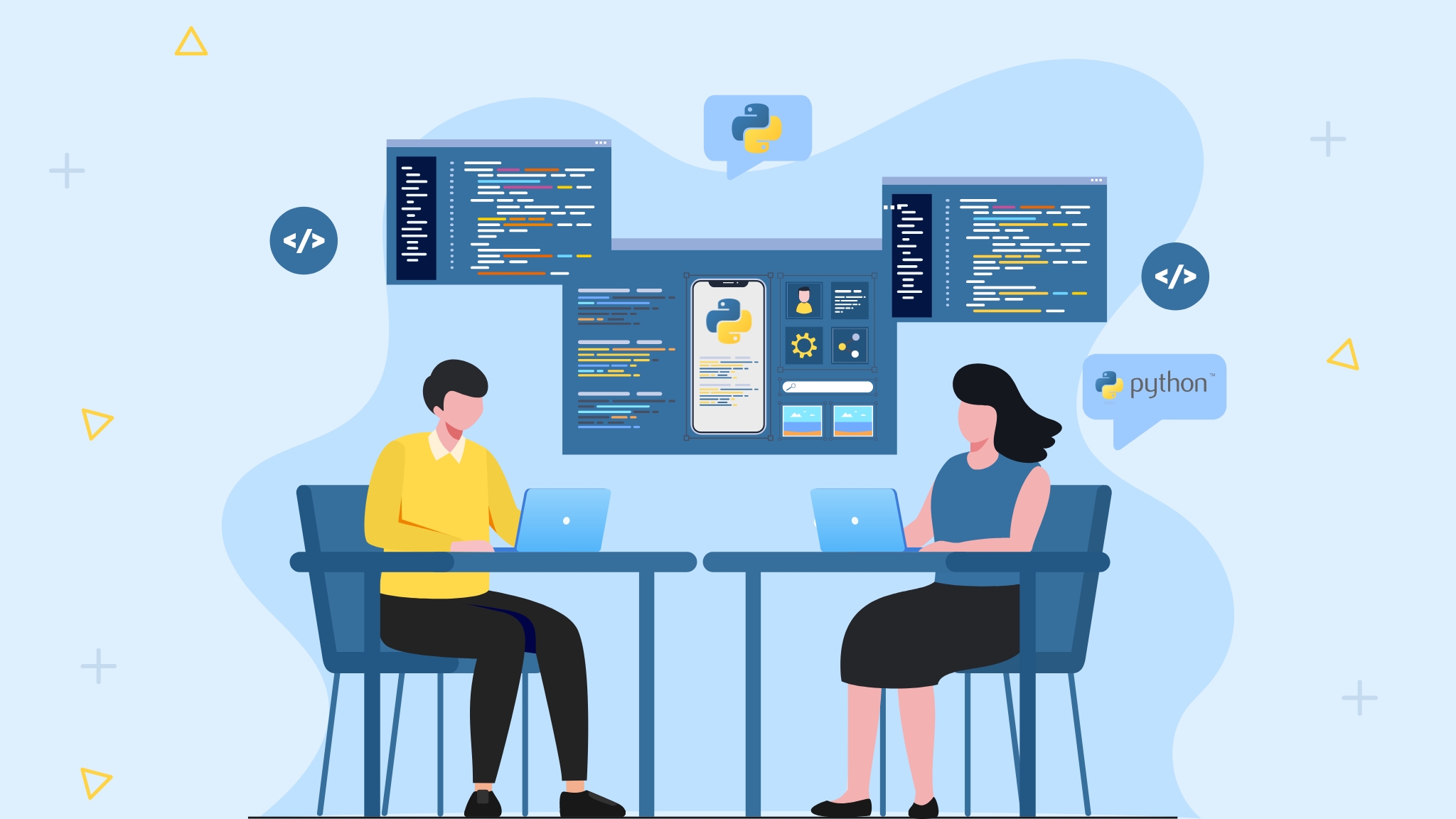Don't miss the chance to work with top 1% of developers.
Sign Up Now and Get FREE CTO-level Consultation.
Confused about your business model?
Request a FREE Business Plan.
SQL or NoSQL Database: What’s the Difference and How to Choose?
Table of contents

The debate around SQL or NoSQL is nothing but the comparison of non-relational vs. relational databases. The distinction lies in the way they are built, the kind of data they store, and how they work. NoSQL databases are distributed and document-oriented while SQL databases are structured.

Structured Query Language (SQL) databases are used to store data for more than 40 years now. With the increasing popularity of web applications and open-source options like MySQL, PostgreSQL, and SQLite, its usage blasted in the late 1990s. On the other hand, NoSQL databases are also gaining traction with famous alternatives, for example, MongoDB, Cassandra, Hypertable and Redis despite the fact that they’ve existed since the 1960s.
Both SQL and NoSQL do the same thing, they store data. But, their methodologies differ. Despite its increasing popularity, NoSQL isn’t a replacement for SQL. It’s just an option. A few projects demand more functions that SQL offers, while others work well with NoSQL and some fits well with both of them. To understand both in a better way, let’s dive into the blog.
The Differences between SQL and NoSQL

The Language
One of the big differences between SQL or NoSQL databases is the language. SQL databases utilize Structured Query Language for characterizing and modifying data. This enables SQL to be greatly flexible and broadly utilized, but, it likewise makes it more restrictive. SQL requires that you utilize predefined schemas to decide the structure of your data before you even start to work with it. Your data should follow the similar structure, too, which can involve both in advance preparation alongside cautious execution.
A NoSQL database includes a dynamic schema for unstructured data and it can be stored in a wide range of ways, whether it is document-oriented, graph-based, and column-oriented or classified as a KeyValue store. This extraordinary flexibility enables you to make documents without first having to precisely define and plan their structure, include fields as you go, and differ the syntax from the database to database. It additionally enables you to give each document its own particular structure, providing you with more freedom overall.
The Structure
SQL is based on tables which makes them a suitable alternative for applications that need multi-row transactions. Samples of these might be accounting frameworks or even legacy frameworks that were initially built for a relational structure. NoSQL databases can be key-value sets, graph databases, wide-column stores or document based.
The Scalability
Another big difference between SQL or NoSQL is their scalability. Most SQL databases are vertically scalable; this implies you can increase their capacity by adding resources such as SSD, RAM or CPU. However, NoSQL DBs are horizontally scalable; this implies they can manage more traffic if you add more servers to the database. NoSQL databases are able to become more powerful and scalable and that makes them the first choice for huge or constantly evolving data sets.
The Community
Because of SQL’s maturity, it has a stronger and developed community as compared to NoSQL. There are a large number of forums and charts accessible where developers can share knowledge and examine SQL best practices, for improving skills. In spite of the fact that NoSQL is developing quickly, its community isn’t well defined as SQL because it is still new.
SQL Database
Advantages
- The combination of Atomicity, Consistency, Isolation and Durability reduces errors and secures the integrity of your database by recommending exactly how transactions interface with the database. NoSQL databases lack ACID compliance with flexibility and processing speed.
- These tools come with better support, and add-ons to deal with the databases, because of the amount of time they have been available in the market.
Disadvantages
- The major issue with SQL is scaling it as your database develops. However, scalability is typically tested in production environments, it’s frequently lower than NoSQL databases.
Examples
- MySQL – It is the most popular open-source SQL database. It functions admirably for CMS sites and web blogs.
- Oracle – It is a C++ based object-relational DBMS that guarantees amazing services and dependability.
- IBM DB2 – an IBM product appropriate for enormous data and analytics.
- Sybase — It is a relational database for organizations which was the first enterprise-level DBMS for Linux.
- MS SQL Server— It is also an enterprise level RDBMS created by Microsoft. It can support both SQL and NoSQL database structures.
- MariaDB—an enhanced, drop-in version of MySQL.
- PostgreSQL— It utilizes procedural languages like Python and Perl, alongside the SQL-level code.
NoSQL Database
Advantages
- NoSQL databases guarantee that data doesn’t become the bottleneck when the majority of components of your server-side application are designed to be fast and seamless.
- You can store an enormous amount of data with little to no structure. Additionally, NoSQL database sets no restrictions on the kinds of data you can store together, enabling you to include more new kinds as your needs change.
- Cloud-based storage is a nice and cost-effective solution, despite the fact that you’ll need to spread the data over numerous servers to scale up. NoSQL databases are intended to be scaled over numerous data centers easily.
- You don’t need to prep NoSQL data ahead of the time. The non-relational quality of a NoSQL database lets you rapidly make a database without building up a detailed database model, sparing you a lot of development time.
Disadvantages
- The NoSQL community does not have the maturity of MySQL user base since it is new. While the network is quickly developing, until now, SQL DBMS like MySQL is difficult to compete for its vast network of experienced end users.
- The main issue with NoSQL databases is the absence of reporting tools for analysis and performance testing. With SQL, on the other hand, you can locate an extensive variety of reporting tools to enable you to prove your application’s validity.
- You’ll confront compatibility problems with SQL instructions. In the query languages, new databases utilize their own particular attributes, and they’re not yet 100% compatible with the SQL utilized in relational databases.
- There’s an absence of standardization that can create problems while migration in NoSQL.
Examples
- MongoDB: This open source database written in C++ comes with a storage that is document oriented.
- Cassandra: If you want high scalability and availability without compromising on performance, Cassandra is for you.
- Hypertable: It is an open source, high performance and greatly scalable database.
- Amazon SimpleDB: It is a highly flexible and accessible non-relational data store that offloads the work of database administration.
So Which Database Is Right For Your Business: SQL or NoSQL?

SQL is a nice alternative for any business that will profit from its set schema and pre-defined structure. For instance, applications that require multi-row transactions – like accounting frameworks or frameworks that monitor inventory – or that keep running on legacy frameworks will flourish with the MySQL structure.
NoSQL, on the other hand, is a suitable alternative for organizations that have databases with no clear schema definitions. Or, if you can’t define a schema for your database, if you get yourself denormalizing data schema, or if your schemas keep on changing – as is particularly the case with mobile applications, CMS, real-time analytics, etc, NoSQL is a perfect fit for you.
If you’re still not sure about which type of database will suit your business, you can schedule a consultation with one of our experts here.
Rate this article!
(9 ratings, average: 4.78 out of 5)
Join 60,000+ Subscribers
Get the weekly updates on the newest brand stories, business models and technology right in your inbox.

Humane yet subtle, Naiya is a girl full of ideas about almost everything. After earning a bachelor’s degree in computer science and engineering, she decided to merge her technical knowledge with her passion for writing – to accomplish something interesting with the fusion. Her write-ups are usually based on technology, mobile apps, and mobile development platforms to help people utilize the mobile world in an efficient way. Besides writing, you can find her making dance videos on Bollywood songs in a corner.

Telemedicine 2.0 - A Comprehensive Guide On What Healthcare Providers Need To Know?
Discover how the latest advancements like Artificial Intelligence in telemedicine are reshaping patient care. This comprehensive resource offers insights into the key trends and innovations driving this shift, providing valuable knowledge for healthcare professionals looking to stay ahead.
Download Now!Subscribe to Unlock
Exclusive Business
Insights!
And we will send you a FREE eBook on Mastering Business Intelligence.


















